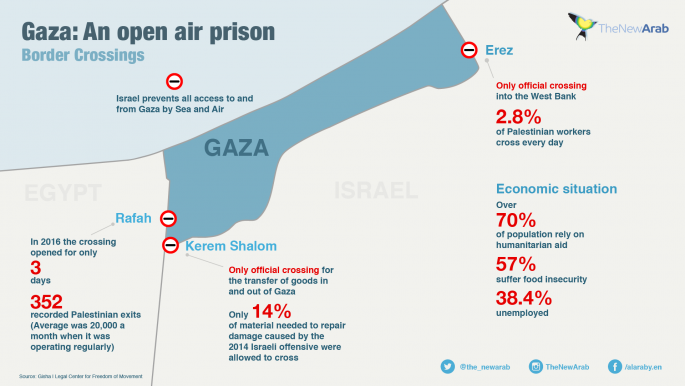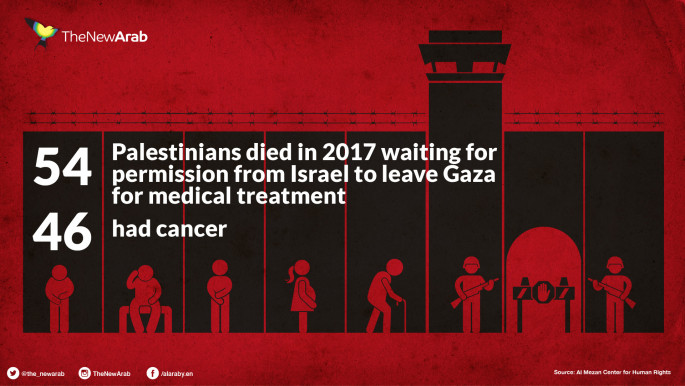Leaving Gaza's open air prison: Thousands abandon blockaded Strip as Egypt opens crossing
Following the announcement, thousands of Gazans, who have been hit hard by the sharply deteriorating economic and living conditions, rushed to leave the Gaza Strip, some of whom have been waiting for the opportunity for years.
The border crossing normally only opens on average three to four times a year and is crucial to deliver aid to civilians in the besieged Gaza Strip, where Israel has maintained a crippling siege for more than a decade. Human rights groups say it amounts to collective punishment of Gaza's two million residents.
Read also: 'Staring at freedom a footstep away': How Gazans struggle to leave through the Rafah border
Egyptian authorities initially opened the crossing on May 18, and then extended it for another two months after Ramadan, allowing around 400-500 people to cross per day.
Since then, at least 19,000 people are estimated to have left the Strip, but the eagerness to leave comes as no surprise.
Many Palestinians in Gaza live below the poverty line. Unemployment is at 44 percent and unemployment among young people exceeds 60 percent. Those who are employed work long hours for extremely low salaries, typically ranging between $200 to $300.
 |
Many Palestinians in Gaza live below the poverty line. Unemployment is at 44% and unemployment among young people exceeds 60% |  |
Escaping the 'open air prison'
People from all walks of Gaza's tough life rushed for their ticket out of the open air prison they've been trapped in for 12 years now.
Many included the unemployed or grossly underpaid, highly educated young people who felt that their hard work, qualifications, and competency were not enough to bring them any kind of a decent life in their home country.
"Travelling abroad to find work was never in my plans," says Mohammed Najjar.
"I graduated in 2010 from the engineering school of Al-Azhar university, but I have only been able to find one job that lasted six months in the last eight years.
"I have waited and hoped that the political and economic conditions will improve over time. But nothing has. It has only got worse over time," he adds.
Hasan Nasir holds a master's degree in Economics and is among those who left.
"Contribution to my country and my people has always been my number one priority, but the hard conditions and the bleak future of Gaza has compelled me to think about the lives of me and my family. We deserve better than to live in poverty and misery," Hasan says.
"If poverty doesn't kill you, the next war on Gaza will."
 |
|
Fears of most qualified leaving
While some have encouraged the mass migration out of Gaza on the account that it is densely populated, with 1.9 million people, and that opportunities in the Strip are extremely rare, many others also expressed fear and worry.
Some believe that what is happening is a human capital flight and a mass emigration of the most qualified and competent.
The main case that sparked debate was the recent migration of around a hundred of Gaza's most brilliant doctors, many of whom are reportedly indispensable to Gaza's health sector.
"It's unfortunate that some of Gaza's top doctors have left the Gaza Strip," said Abdullatif Alhaj, the General Director of hospitals in the Ministry of Health.
"The ministry of health usually rejects the resignations of these doctors because we need them. We always try hard to convince them to stay, but when they insist on resignation, we have no choice but to comply to their requests."
 |
The 12-year long blockade on Gaza changed life in the Strip to a life of growing misery, suffering and anxiety |  |
Montaser Ismail, a former consultant surgeon at the European Gaza hospital and one of Gaza's top doctors was one of the ones to recently leave.
"The 12-year long blockade on Gaza changed life in the Strip to a life of growing misery, suffering and anxiety," he tells The New Arab.
"This economic crisis was then exacerbated by the sanctions imposed by the Palestinian Authority, especially the unjust decision to deduct more than 60 percent of our salaries. What's left from our salaries is not enough for necessities," Dr Ismail adds.
"I had to work day and night in the private sector to compensate for this severe shortfall, which kept me away from my family and my children."
 |
|
Dr Ismail added that the income from private clinics is not worthwhile either due to the deep economic recession, saying that this has "led to the impoverishment of virtually every single Gazan."
"I personally can cope and live with that insufficient salary, but what really prompted me to leave the Gaza Strip is that I want to guarantee a decent life and a decent future for my children," he explains.
"Patients in Gaza will find other doctors, but my children will only have one father to take care of them."
But he also acknowledged that this emigration of doctors from the Gaza Strip will definitely affect the health sector.
"It's now in the hands of the Palestinian officials. It's not too late for them to save the situation before it aggravates irreparably. People's livelihoods should not be caught in the middle of political animosities.
"If the challenges imposed upon the Palestinians in Gaza were only caused by the Israeli occupation, we will bear it - we're tenacious and stubborn people. But what pains us is being stabbed in the back by those who are supposedly responsible for us," says Dr Ismail.
However, there are also some in Gaza who are calling on authorities to make it harder for qualified people like Dr Ismail to leave the Strip.
In a Facebook post, professor of history at the Islamic University of Gaza, Khalid Khaldi, stated that those with high and indispensable qualifications should be prevented from travelling outside the Strip, seeking a similar action as what Saddam Hussein did during the Iraq blockade.
Read also: Gaza's blockade on young talent
Bright future
In the past month and a half, many people rushed to make passports or renew their old unused ones, as embassies and travel offices became even busier.
One travel company said that they had issued 2,000 travel visas to Turkey in the last 10 days alone.
Turkey and Malaysia are the top destinations for Gazans as visas are issued easily and more frequently by these two countries.
Qasim left the Gaza Strip with his wife and his two children and moved to the UAE.
"Like many Gazans, I have had the feeling for a while that the worst is yet to come," Qasim says.
"I have two teenage sons who suffer from severe posttraumatic stress disorder (PTSD) due to the 2014 Israeli assault on the Gaza Strip. The life of zero luxuries in the Gaza Strip doesn't help them to recover, but rather worsens their stress and their depression," he explains.
"It's about time that they had a bright life and even brighter future ahead."
Ali Adam is a journalist and researcher whose work focuses on issues linked to the Israeli-Palestinian conflict.



